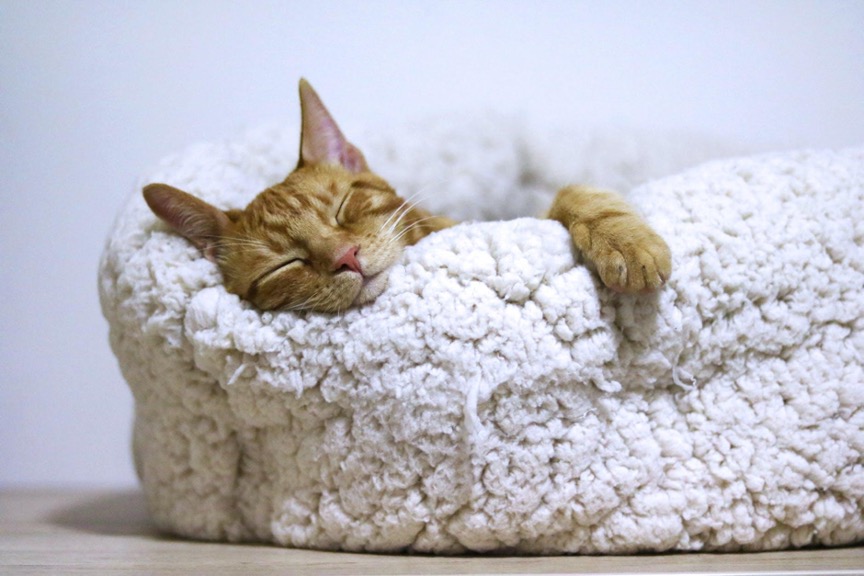We all know the importance of a good night’s rest. If your sleep is constantly interrupted by you waking up in the night, here are seven tips to try. Getting into bed at the end of a long day is a great feeling. But waking in the middle of the night and then tossing and turning for hours trying to fall back asleep is miserable.

A disrupted sleep cycle doesn’t only ruin the moment — it can also ruin your entire next day. Without enough sleep, you’ll wake up feeling restless, less productive, and sometimes incapable of tackling all the work you have to do.
Do you have a hard time dozing back off when you wake up to noise or to use the bathroom? Here are seven tips to fall back asleep if you wake up in the middle of the night.
1. Make Sure You’re Comfortable
A lot of people wake up in the middle of the night because they’re simply not comfortable. For some people, it’s the need to use the bathroom. For some, it’s that the room is too hot or too cold. For others, it’s the distraction of bright light or noise from outside.
The best way to get a solid night’s sleep is to turn your bedroom into a sleep sanctuary. Your bedroom should be cool and dark. It should be free of lights, sounds, and other distractions. It should be a place that promotes comfort, not disturbs it.
2. Don’t Check Your Phone
If you wake up in the middle of the night, resist the urge to reach for your phone, open your tablet, or turn on the TV. Devices with screens that emit blue light only make it harder to fall back to sleep.
Blue light suppresses melatonin (the hormone that makes you sleepy). It actually tricks the mind into thinking it’s daytime and that you should be awake. Reaching for a device will not lull you back to sleep. It’s much more effective to close your eyes and embrace the darkness!
3. Keep Your Eyes Off the Clock
There’s nothing fun about lying in bed tossing and turning for hours. But keeping a minute-by-minute account of how much time is passing by won’t do anything to help you fall back to sleep.
Resist the urge to look at the clock (especially the one on your phone). Worrying about how much time you’re not sleeping will only make you feel more anxious and stressed. With strong feelings of anxiety, sleep is even harder to achieve.
4. Try Some Relaxation Methods
There are many ways to relax back to sleep — and counting sheep is not one of them.
A great way to relax is to practice deep breathing. The more relaxed you are, the less stress you’ll feel, and stress is your worst nightmare if you’re trying to fall asleep. Simple deep breathing exercises (of which there are many) can calm your body, ease stress levels, and help you doze off.
Another way to relax is to practice meditation techniques. Meditation creates a calm and tranquil mind, which helps to end distractions. The fewer distractions, the more likely you are to fall asleep. Learning how to relax your muscles can also help. This stress management technique incorporates deep breathing along with physical muscle relaxation.
To practice progressive muscle relaxation, you’ll need to stretch all the muscles in your body in a particular order. It starts with clenching the hands, extending the wrists and forearms, and bending your elbows and biceps.
It includes wrinkling your brow, closing your eyes tightly, and smiling widely to stretch your cheeks and jaws. To be most effective, you’ll want to work your way through various muscle groups, ending with pointing your toes to work the muscles in the lower legs.
The University of Michigan Medicine website has a complete guide on how to achieve progressive muscle relaxation.
5. Get Up and Move Around
While meditation and relaxation are great ways to help you fall back to sleep, getting up and moving around can also work.
If you haven’t fallen back to sleep after twenty minutes or so, get up and get out of bed. Find a comfortable, quiet space in a different room where you can read or listen to soft music. After a few minutes, return to bed. Sometimes, calming activity is all it takes to make your body ready for sleep.
6. Try a Sleep App
From soothing sounds to sleep casts, there are many sleep apps that can help you fall back to sleep when you’re feeling restless.
Apps like Headspace, Slumber, and Calm offer everything from adult bedtime stories to sound effects like thunder and wind. Just be sure not to look at the app while it’s doing its thing. Set your phone on your bedside table so that you can hear it but not see it.
Remember, too much blue light will only keep you more awake!
7. Don’t Stray From Your Schedule
Waking up in the middle of the night could be a sign you’ve slept too much throughout the day. It can be tempting to want to take a nap in the afternoon, especially if you didn’t sleep well the night before. But if napping isn’t part of your regular routine, avoid it.
It’s crucial that you maintain good sleep habits and a daily sleep routine. Structure your day so that you get in bed at the same time every night and get up at the same time every morning. Don’t sleep in on the weekends or when you don’t have to work. Instead, stick to the same schedule every single day.
Conclusion
You can do lots of things to help yourself fall back to sleep when you wake up in the middle of the night. The trick to falling back to sleep is to relax your mind and body so that it’s ready for slumber.
Start by trying:
- Meditation
- Sleep apps
- Eliminating blue light exposure
Getting a good night’s sleep is essential, so if one method doesn’t work for you, try a different one. The better you sleep, the better you’ll feel in the morning and the more productive you’ll be.
[Author bio]
Ryan Sundling is a Group Marketing Manager at Cardinal Group Management. He has over ten years of experience in the conventional housing industry and works with The Proper on a daily basis to help them with their marketing efforts.

Interesting Related Article: “How to Stop Snacking at Night [7 Sweet Tooth Fighting Tips]“

